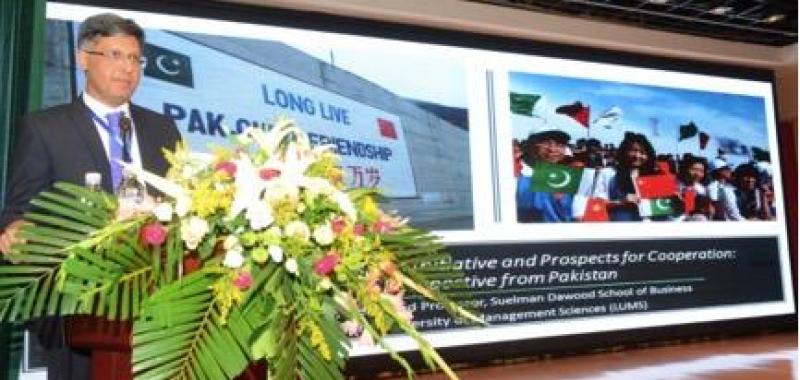
The International Business Education Forum hosted by Lanzhou University, Foreign Affairs Office of Gansu Provincial People’s Government, Dunhuang Municipal Government, and organised by School of Management, Lanzhou University was held in Dunhuang, Gansu, China on September 27, 2017. The Forum invited deans from business schools in China and along the 'Belt and Road' countries as well as guests from the government and industries to discuss the latest trends and hot issues of current business education, the opportunities and challenges faced by enterprises in the context of the 'Belt and Road’ and the role business education and business schools play in promoting the 'Belt and Road' construction.
Guofu Zhong, the Vice Party Secretary of Lanzhou University said at the opening ceremony that in the past, the Silk Road carried silk, herbs, spices, jewelry, etc., but now it provides talents, new technology and information. He said that the forum will build a communication and cooperation platform among the Silk Road Universities and take on the role of a think tank.
Huijun Ma, the Publicity Minister of Dunhuang Municipal Committee, said that the Silk Road bears heavy civilisation and friendship, and the 'Belt and Road’ carries hope and vision for opening-up and innovation. He said that Dunhuang will continue to be committed to creating a new Silk Road corridor, a new channel of cooperation and will support the 'Belt and Road’ academic exchanges and mutual benefit as always to promote exchanges and cooperation between universities and enterprises.
During the Forum, the deans and entrepreneurs suggested spreading advanced business development experience such as Internet+ and shared economy with the help of business schools and build a ‘Digital Silk Road’ economic zone: the Internet Silk Road to strengthen network interconnection and information exchange between China and countries along the 'Belt and Road.’
Kunrong Shen, Dean of Nanjing University Business School, said during the interview that to build the ‘Digital Silk Road’ conforms to the new model brought about by technological changes. It will benefit countries along the Silk Road and promote information sharing. The exchange and cooperation will be more convenient and faster and the cost will be greatly reduced. In addition, the global business education will cultivate more management personnel for the construction of the 'Belt and Road.’
Dr. Jawad Syed, Dean of Suleman Dawood School of Business (SDSB), Lahore University of Management Sciences (LUMS), Pakistan said that the construction of the 'Belt and Road' offers an unprecedented opportunity for Pakistan." China Telecom has expanded its business to Pakistan and a 'Digital Silk Road' in South Asia is just around the corner," he said.
Dr. Syed also said that the China–Pakistan Economic Corridor (CPEC) is rapidly improving Pakistan's infrastructure and is estimated to have created 150,000 jobs. At present, Pakistan has planned many special economic zones (SEZs) and is in urgent need of young business talent. He said that the Suleman Dawood School of Business is striving to provide the needed talent. Dr. Omair Haroon, Director of China Pakistan Management Initiative (CPMI), LUMS accompanied Dr. Syed to the Forum.
Gregory Mosier, Dean of College of Business, University of Nevada, Reno said, “I know that the Silk Road has a lot of influence on our economy, science, technology, transportation and energy. It brings us closer and has brought new investment and cooperation opportunities that will have deep implications for the international community, but to address the culture differences during the process, we must take the road of innovation."
Huixin Yang, Dean of School of Management, Shandong University, said that with the rise of the 'Belt and Road’, Chinese enterprises are constantly ‘going out’, investing in the countries along the road, and carrying a lot of infrastructure projects, but when faced with different cultural backgrounds, the enterprises need to understand the political and business environment, legal policy and local cultural customs. "Business education can provide such trainings, help enterprises to integrate into the investment countries, reduce conflicts and enhance consensus," he said.
Source: Sina Finance, September 27, 2017, translation by Lanzhou University

